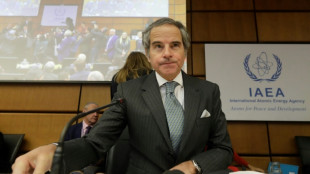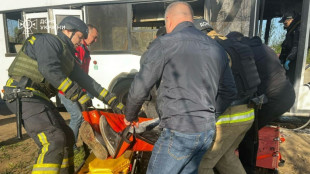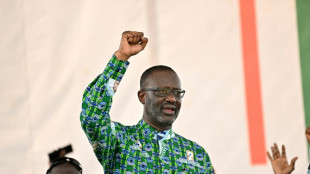UK hosts downgraded Ukraine talks as Easter truce shatters
Envoys from Washington, Kyiv and European nations gathered for talks in Britain on Wednesday amid a new US push to end Russia's war in Ukraine, but a planned meeting of foreign ministers was postponed.
The London meeting comes as US media reported that President Donald Trump is ready to accept recognition of annexed land in Crimea as Russian territory, and as fresh air strikes shattered a brief Easter truce.
The reports said the proposal was first raised at a similar meeting with European nations in Paris last week. Trump has since threatened to "take a pass" on efforts to end the conflict unless progress is made quickly.
A Russian drone strike on a bus transporting workers in the southeastern city of Marganets killed at least nine people and wounded at least 30 more, the Dnipropetrovsk regional governor said on Wednesday.
Ukrainian authorities also reported strikes in the regions of Kyiv, Kharkiv, Poltava and Odesa.
In Russia, one person was reported wounded by shelling in the Belgorod region.
UK Foreign Secretary David Lammy had been due to lead Wednesday's meeting, but his ministry said that the talks had been downgraded in a sign of the difficulties surrounding the negotiations.
"The Ukraine Peace Talks meeting with Foreign Ministers today is being postponed. Official level talks will continue," said the Foreign Office.
- 'Work for peace' -
US Ukraine envoy Keith Kellogg is still expected to attend, along with Emmanuel Bonne, diplomatic adviser to French President Emmanuel Macron.
Andriy Yermak, a top aide to Ukraine President Volodymyr Zelensky, said Wednesday that he had arrived in London with Defence Minister Rustem Umerov and Foreign Minister Andriy Sybiga -- who is "likely" to meet Lammy.
"Despite everything, we will work for peace," Yermak wrote on Telegram.
A Ukraine presidency source later told AFP that the delegation would meet with Kellogg, and that "There will be more meetings with Europeans, different meetings".
US presidential envoy Steve Witkoff is to visit Moscow this week, the White House has confirmed, in what would be his fourth trip to Russia since Trump took office.
According to The Financial Times, President Vladimir Putin told Witkoff he was prepared to halt the invasion and freeze the current front-line if Russia's sovereignty over the Crimean Peninsula, annexed in 2014, was recognised.
Kremlin spokesman Dmitry Peskov responded by saying that "a lot of fakes are being published at the moment", according to the RIA Novosti state news agency.
Zelensky said Tuesday that his country was ready for direct talks with Russia only after a ceasefire.
The Kremlin has warned that it cannot rush into a ceasefire deal.
Trump promised on the campaign trail to strike a deal between Moscow and Kyiv in 24 hours but has since failed to secure concessions from Putin to halt his troops in Ukraine.
He said at the weekend he hoped an agreement could be struck "this week".
US, French and British foreign ministers, along with a senior German official, met in Paris last Thursday to discuss events.
Secretary of State Marco Rubio said he had presented a US plan to end the war but no details were given. Rubio also discussed the plan with his Russian counterpart, Sergei Lavrov, during a telephone conversation after the Paris meeting.
- Trump 'frustrated' -
Rubio and Trump have warned since the Paris talks that the United States could walk away from peace talks unless it saw quick progress.
Trump "wants to see this war end... and he has grown frustrated with both sides of this war, and he's made that very known", his spokeswoman Karoline Leavitt said Tuesday.
Rubio had said in Paris last week he would go to London if he thought his attendance could be useful.
But Lammy wrote on X late Tuesday that he had instead had a "productive call" with Rubio.
"The UK is working with the US, Ukraine and Europe for peace and to put an end to Putin's illegal invasion. Talks continue at pace," he added.
Trump proposed an unconditional ceasefire in March, the principle of which was accepted by Kyiv but rejected by Putin.
The White House welcomed a separate agreement by both sides to halt attacks on energy infrastructure for 30 days, but the Kremlin has said it considers that moratorium to have expired.
P.Roux--PS

 London
London

 Manchester
Manchester
 Glasgow
Glasgow
 Dublin
Dublin
 Belfast
Belfast
 Washington
Washington
 Denver
Denver
 Atlanta
Atlanta
 Dallas
Dallas
 Houston Texas
Houston Texas
 New Orleans
New Orleans
 El Paso
El Paso
 Phoenix
Phoenix
 Los Angeles
Los Angeles


